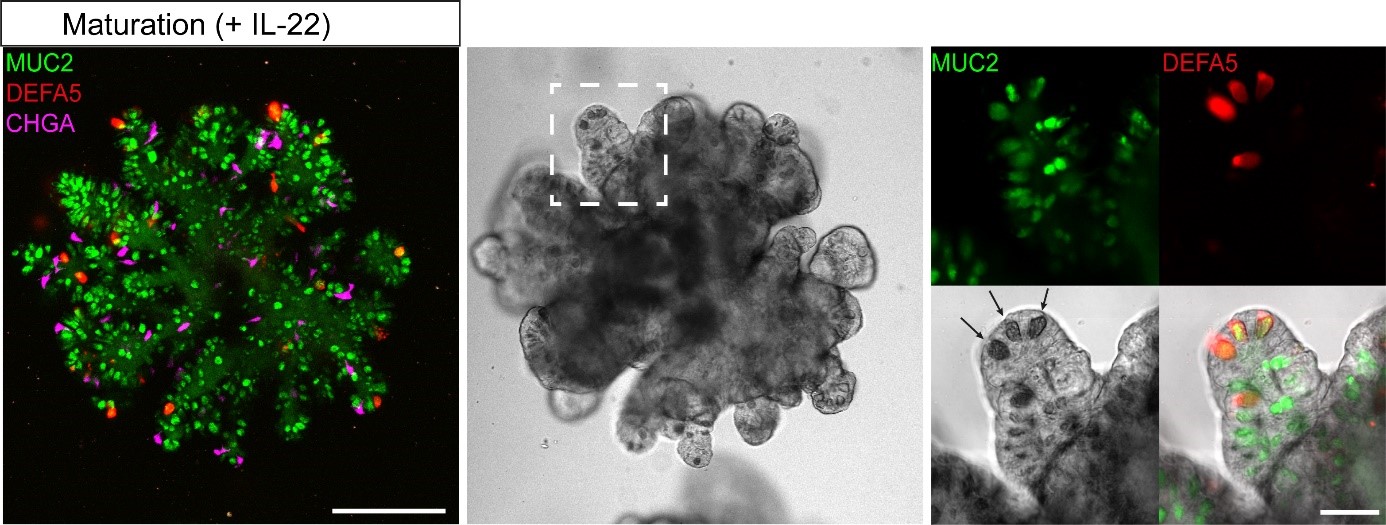Improved model of human small intestine
Researchers at the Maastricht MultiModal Molecular Imaging Institute (M4i) have collaborated on a study to improve small intestine organoids. These are miniature small intestines that researchers use to study the functioning of the small intestine during health and disease. Unlike previous small intestine organoids, the new miniature small intestines also contain Paneth cells, which are critical to the proper functioning of the organ. The results of the study were published in Cell Stem Cell on August 23.
The development of organoids has meant a great deal for research into the functioning of human organs and tissues. The mini-organs can closely mimic the processes within the human body. Yet some of the organoids developed do not yet fully correspond to the organs in our bodies. Therefore, researchers from the Organoid group, including associate professor Carmen Lopez-Iglesias and professor Peter Petersen from Maastricht University, have developed an improved version of the small intestine organoids. These organoids contain all types of cells from the human small intestine.
Missing Paneth cells
The small intestine is made of many different types of cells, including enterocytes, stem cells and Paneth cells. Together, these cells form the barrier between the side where the food eaten passes and the side where the blood vessels and immune cells are located. The stem cells continually produce new cells, maintaining this barrier. The Paneth cells are mainly important in the intestines for fighting infections. For this purpose, the cells produce so-called antimicrobial peptides. These molecules inhibit harmful bacteria, preventing them from infecting the gut. If there are no active Paneth cells present in the intestine, the small intestine will be more susceptible to infections. This is the case in several diseases, including inflammatory bowel disease (IBD). The previous version of small intestine organoids lacked Paneth cells. As a result, the miniature small intestines were not a complete representation of the original, healthy human small intestines. Researchers in the Organoid group joined forces with other scientists to develop improved organoids, including Paneth cells.

Surprising result
To study how the formation of Paneth cells could be stimulated, the researchers tested many different molecules. In this way, they discovered that the molecule Interleukin-22 (IL-22) increased the number and activity of Paneth cells. This effect came as a surprise. Researcher Gui-Wei He explains why: "It is currently thought that IL-22 can improve the function of stem cells. Our study shows that this does not happen, but that IL-22 actually stimulates the activation of Paneth cells." Based on the discovered effect, the researchers used IL-22 to stimulate the number of active Paneth cells in human small intestinal organoids. This eventually led to the development of organoids that closely mimic the healthy small intestines in the human body.
Future research
Now that optimized organoids of the human small intestine are available, researchers can take new steps in their research. For example, they can make mutations in the DNA of the cells in the organoids. In this way, the researchers can determine how mutations - which occur in diseases such as IBD - alter the function of the small intestine.
Source: Hubrecht Institute
Also read
-
Dutch Research Council rewards three Maastricht research proposals
The Dutch Research Council (NOW) has decided that within the so-called ENW Open competition XS research programme, 28 projects will receive funding. Three of those projects are headed by a UM scientist.

-
Learning from miscarriages of justice with the European Registry of Exonerations
Why do innocent people sometimes spend years in prison? EUREX is a registry of miscarriages of justice in Europe that ultimately led to exonerations. The aim is to prevent such mistakes being made in future.

-
Two NWO Vidi grants for UM research into beauty particles and lobbyists in Brussels
Twee wetenschappers van Universiteit Maastricht (UM), Keri Vos en Iskander de Bruycker, krijgen een Vidi-beurs van €800.000,- voor hun onderzoeksprojecten.
